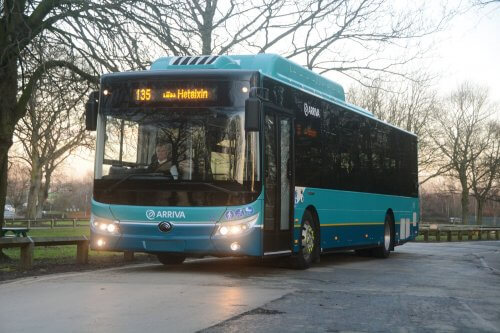Operator is the first to take advantage of a new scheme from Zenobe Energy designed to accelerate the rollout of electric vehicles, and the first to order the Yutong E12
Newport Transport has ordered 15 Yutong E12 electric single-decker buses, which will be supplied by Pelican Engineering.
The order is the first in the UK for the 12m vehicle, which can seat up to 39 passengers and has an operating range of up to 200 miles (330km) according to the manufacturer.
The Yutong E12 demonstrator in Newport Transport livery is due to arrive in July, before the first tranche of seven vehicles arrive in February 2020.
The remaining seven vehicles are due for delivery in April 2020.
It was announced on 6 February that Newport Transport would receive £1.342m of funding from the Ultra-Low Emission Bus Scheme, which has been put towards the new vehicles and infrastructure.

Newport Transport already utilises a number of solar panels, which will help ensure a significant proportion of the energy used to charge the buses is from a renewable source.
The buses, batteries and infrastructure will all be financed by Zenobe Energy, forming part of the £120m the company announced to accelerate the rollout of commercial electric vehicles fleets.
Scott Pearson, Managing Director of Newport Transport Ltd, told CBW: “Newport Transport is delighted to be working with partners Yutong and Zenobe to deliver cleaner, more environmentally friendly transport for the people of Newport, whilst working with the Local Authority to reduce areas of poor air quality in the city.
“This is the start of an ambitious project using green technology to improve transport solutions for the city and its residents.”
Ian Downie, Head of Yutong Bus UK at Pelican Engineering, told CBW: “We’re delighted that working in partnership with Newport and Zenobe we can bring fully zero-emission vehicles to Newport.
“The partnership brings together vehicles, funding and infrastructure for a seamless push button solution to reduce emissions.”
Zenobe, an independent owner and operator of battery storage, has announced the launch of up to £120m of funding to accelerate the rollout of commercial electric vehicle fleets – including buses – and the supporting infrastructure.
It claims this is the first time a private company has stepped in to offer funding and is now inviting organisations to get in touch with electric vehicle fleet projects.
The company said the fund will ‘significantly speed up’ the process of bringing zero-emission vehicles onto the UK’s roads.
Zenobe said it can also provide upfront financing for local authorities, OEMs and operators.
Depending on requirements, the company can own and operate batteries in the depot, smart charging infrastructure and the batteries on the vehicles.
Offering these options should give customers the option of an end-to-end, one-stop solution in exchange for a pence per-mile service fee or a fixed monthly charge, says Zenobe, as well as significantly reduce the upfront cost associated with zero emission buses.
The company claims its services can help make the price of electric buses similar to diesels and could lower the total lifecycle cost by as much as 30% in some cases.
Zenobe will also work with the Low Carbon Vehicle Partnership (LowCVP) to ensure all projects are zero-emission and are compatible with the standards set in the government’s recent ULEB scheme.
Steven Meersman, co-founder of Zenobe Energy, said: “We’re thrilled to announce the Zenobe comprehensive funding solution which helps local councils and commercial fleet operators bring forward the rollout of zero-emission vehicles by several years.
“Using our solutions, we can enable local authorities and operators to access a faster, cheaper and lower-risk way to transition to EVs. We’re calling on organisations to work with us and provide the public with emission-free transport and last-mile deliveries now.”
Jonathan Murray, Policy and Operations Director at the LowCVP, added: “Many bus operators are looking to electrify their vehicles and are a key part of efforts to decarbonise road transport and improve air quality in some of our most polluted areas. Buses require a lot of energy and this creates challenges – and opportunities – for the electricity grid.
“This initiative from Zenobe Energy should be an important enabler of efforts on the part of vehicle operators to switch to zero emission vehicles, whilst making the electricity grid smarter and more resilient at the same time.”
You can read more Bus News here: cbwmagazine.com/category/news/buses

